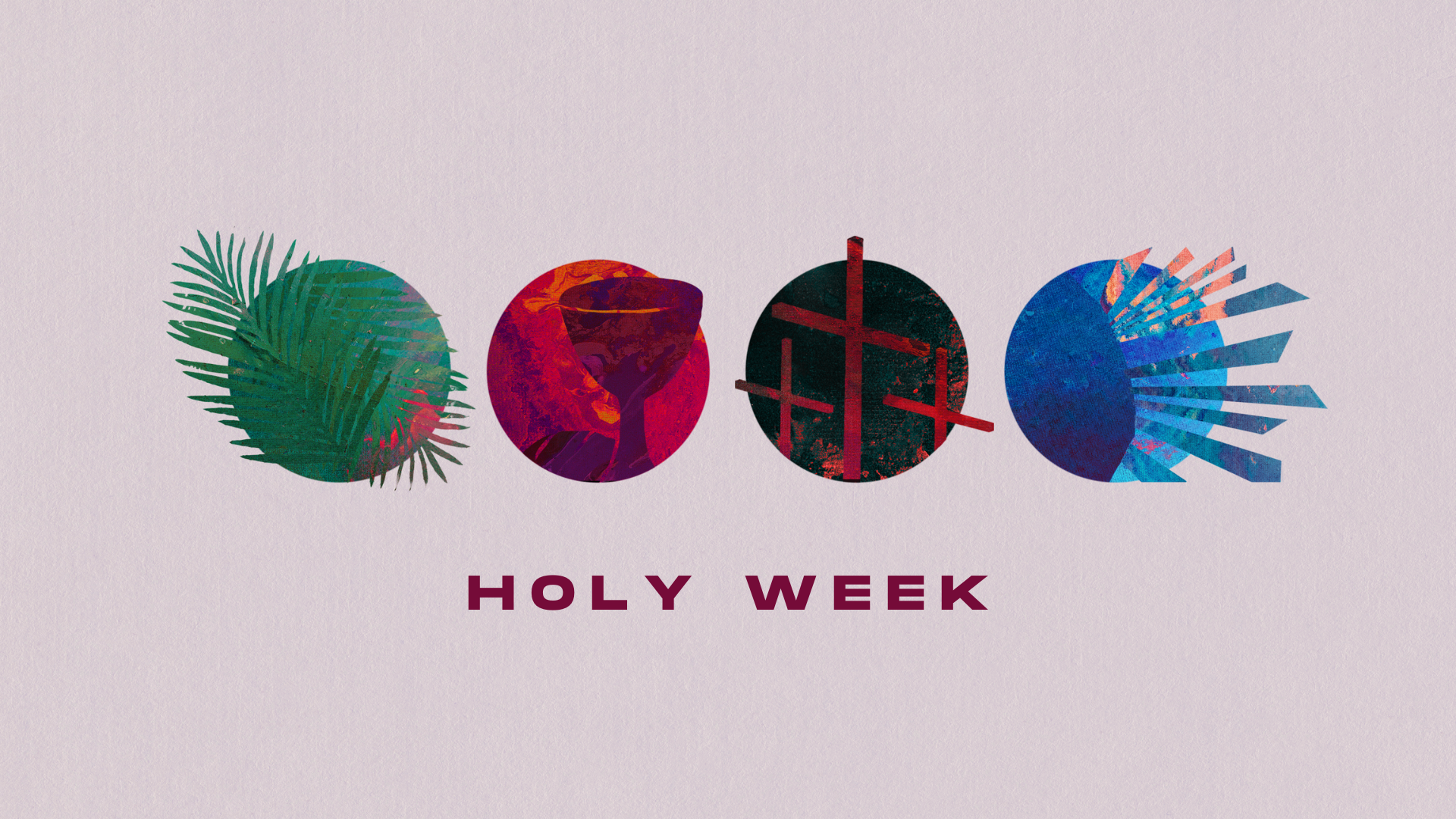“O God, by the passion of Your blessed Son You made an instrument of shameful death to be for us the means of life: Grant us so to glory in the cross of Christ, that we may gladly suffer shame and loss for the sake of Your Son our Savior Jesus Christ; who lives and reigns with You and the Holy Spirit, one God, for ever and ever. Amen” (The 1979 Book of Common Prayer, 2005).
Holy Week: Monday
“Almighty God, whose most dear Son went not up to joy but first He suffered pain, and entered not into glory before He was crucified: Mercifully grant that we, walking in the way of the cross, may find it none other than the way of life and peace; through Jesus Christ Your Son our Lord, who lives and reigns with You and the Holy Spirit, one God, for ever and ever. Amen” (The 1979 Book of Common Prayer, 2005).
Holy Week: Palm Sunday
“…HAVING LOVED HIS OWN WHO WERE IN THE WORLD, [JESUS] LOVED THEM TO THE END” (JOHN 13:1).
Palm Sunday marks the beginning of the end of Jesus’ life on earth. Having loved His disciples throughout His ministry, Jesus continued toward Jerusalem and the cross that awaited. Heading wide-eyed toward a certain execution simply makes no sense unless we remember the truths we’ve already clung to during this Easter season. On Ash Wednesday we remembered that there is no resurrection that is not preceded by death. Throughout Lent we recalled that there is no exaltation that is not preceded by humility. On Palm Sunday we are reminded that the cross by necessity precedes the crown.
The events of the Sunday five days before Passover are recorded in all four gospels (Matthew 21:1-11; Mark 11:1-11; Luke 19:28-40; John 12:12-19). Three of the four accounts reference palm branches or leafy branches that the crowd waved and laid along the path into Jerusalem, along with their coats. Many liturgical churches today will hold processions into their sanctuaries waving palm branches commemorating the approach of Jesus into Jerusalem during the final week of His life on earth. But perhaps the most important symbol of the day is not the palm branches, but the unbroken (previously unridden) donkey colt, the symbol Jesus chose.
Around 520 BC, the prophet Zechariah foretold of the righteous and victorious King that will come to Jerusalem humbly, “riding… on a colt, the foal of a donkey” (Zech. 9:9). Approximately 550 years later, Jesus fulfills the sign of the King of the universe coming on a donkey’s colt.
Triumphal entries were by no means unique to the story of Jesus. The Roman Triumph (and here, and here) was as ingrained in the culture of the Roman Empire as fireworks on July 4, the celebration of Independence Day in the United States. Artistic depictions such as the Triumph of Aemilius Paulus by Carle Vernet (1789) illustrate the pomp and pageantry; victorious generals crowned with laurel wreaths riding into Rome in gilded chariots loaded down with the spoils of war, drawn by splendid horses. (More artistic examples are here, here, and here.)
Compared to such pageantry, how pitiful Jesus’ “triumphal” entry into Jerusalem must have seemed. Instead of laurel wreaths, the people simply hacked off palm branches to wave. Instead of a gilded chariot, people threw down their coats, both as a saddle and a path. Instead of mighty war horses, Jesus enters on a borrowed unbroken donkey foal—not even trained for riding. There are no spoils of war. And at the end of the path, there is not glory that awaits, but a cross, the highest dishonor Rome could offer.
Ignited by the resurrection of Lazarus of Bethany from the dead (John 11), the people saw in Jesus a hope of liberty and salvation. Yet, liberty and salvation from what? They tell us by the greeting they shouted at Jesus as He entered their midst:
Hosanna!
Blessed is He who comes
in the name of the Lord!Blessed is the coming kingdom
of our father David!
Hosanna in the highest heaven!Mark 11:9-10
“Hosanna!” The word is an urgent plea, an exhortation. “Save us now!” they cried. “Victory now!” they all but demanded. Having raised a man from death, could this Jesus not also subdue Rome? The people longed for the promise of a foretold king, but for what sort of kingdom—a heavenly or an earthly one? For what sort of liberty do they cry out—political or spiritual? This crowd yelled for a king to conquer Rome because they could not even see their greater need for the One King who would conquer sin and death. This blindness is precisely the reason Jesus wept for the city saying, “If you knew this day what would bring peace—but now it is hidden from your eyes” (Luke 19:41-42).
“Palm Sunday reveals Jesus’ humility. He is not like other kings who enter cities atop war horses in celebration of bloody victory. He is the humble king who saves by dying for the sins of the world” (McCauley, 2022). Jesus is certainly the promised Son of David, but the shape of that kingship is cruciform—cross-shaped. All of Jesus’ life, from His very first cries in the manger, have led to this moment, this place, this holy week.
As disciples (students and followers) of Christ, are we willing to follow on this road knowing it must pass through Golgotha, the place of death? Are we willing to trade the triumphant war horse for the humble donkey foal? “If we are going to follow Jesus, then we do not have to fight the way the world fights. We do not use their tools and means to get what we want” (McCauley, 2022). More than we do not, we cannot. Is the surpassing knowledge of Jesus Christ, the invitation of union with Him a dear enough prize that we would count all else as waste and declare with the apostle Paul, “My goal is to know Him and the power of His resurrection and the fellowship of His sufferings, being conformed to His death…” (Phil. 3:10, emphasis mine)? Will we join this prayer with the saints of the global church:
Almighty and everlasting God, in Your tender love for the human race You sent Your Son our Savior Jesus Christ to take upon Him our nature, and to suffer death upon the cross, giving us the example of His great humility: Mercifully grant that we may walk in the way of His suffering, and also share in His resurrection; through Jesus Christ our Lord, who lives and reigns with You and the Holy Spirit, one God, for ever and ever. Amen.
LEARN MORE ABOUT PALM SUNDAY AND THE REST OF THE EASTER SEASON
Lent: The Season of Repentance and Renewal (Fullness of Time) by Esau McCauley (2022, IVP Formatio)
The 1979 Book of Common Prayer (2005, Oxford University Press)
NEXT WEEK: Easter Eggstravaganza!
Mark your calendars to join us for a free time of food, fun, & fellowship! All are warmly welcome.
What can I expect?
Lunch will be served (hot dogs, hamburgers, & fixings)
Easter egg hunt with areas divided by general age groups
Weather permitting, both inside & outside games for all ages
What should I bring?
The most important thing to bring is yourself & all the family & friends your vehicle will hold! Nothing else is required.
If you’d like, you’re welcome to contribute to the Easter eggs for the egg hunt, or bring a container to participate. We’ll have a few extra baskets on hand too.
More questions? Contact us.
Read the Bible: Matthew 27:57-66
When it was evening, a rich man from Arimathea named Joseph came, who himself had also become a disciple of Jesus. He approached Pilate and asked for Jesus’s body. Then Pilate ordered that it be released. So Joseph took the body, wrapped it in clean, fine linen, and placed it in his new tomb, which he had cut into the rock. He left after rolling a great stone against the entrance of the tomb. Mary Magdalene and the other Mary were seated there, facing the tomb.
The next day, which followed the preparation day, the chief priests and the Pharisees gathered before Pilate and said, “Sir, we remember that while this deceiver was still alive he said, ‘After three days I will rise again.’ So give orders that the tomb be made secure until the third day. Otherwise, his disciples may come, steal him, and tell the people, ‘He has been raised from the dead,’ and the last deception will be worse than the first.”
“Take guards,” Pilate told them. “Go and make it as secure as you know how.” They went and secured the tomb by setting a seal on the stone and placing the guards.
Matthew 27:57-66 (CSB)
COMING SOON: Ladies' Day
Join us as we acknowledge the ministry contributions of the ladies of Springfield PFWB Church. Our special guest speaker will be Amber Sloan Dail.
Questions? Contact us.
Read the Bible: Matthew 27:45-56
From noon until three in the afternoon, darkness came over the whole land. About three in the afternoon Jesus cried out with a loud voice, “Elí, Elí, lemá sabachtháni?” that is, “My God, my God, why have you abandoned me ?”
When some of those standing there heard this, they said, “He’s calling for Elijah.”
Immediately one of them ran and got a sponge, filled it with sour wine, put it on a stick, and offered him a drink. But the rest said, “Let’s see if Elijah comes to save him.”
But Jesus cried out again with a loud voice and gave up his spirit. Suddenly, the curtain of the sanctuary was torn in two from top to bottom, the earth quaked, and the rocks were split. The tombs were also opened and many bodies of the saints who had fallen asleep were raised. And they came out of the tombs after his resurrection, entered the holy city, and appeared to many.
When the centurion and those with him, who were keeping watch over Jesus, saw the earthquake and the things that had happened, they were terrified and said, “Truly this man was the Son of God!”
Many women who had followed Jesus from Galilee and looked after him were there, watching from a distance. Among them were Mary Magdalene, Mary the mother of James and Joseph, and the mother of Zebedee’s sons.
Matthew 27:45-56 (CSB)
Read the Bible: Matthew 27:27-44
Then the governor’s soldiers took Jesus into the governor’s residence and gathered the whole company around him. They stripped him and dressed him in a scarlet robe. They twisted together a crown of thorns, put it on his head, and placed a staff in his right hand. And they knelt down before him and mocked him: “Hail, king of the Jews!” Then they spat on him, took the staff, and kept hitting him on the head. After they had mocked him, they stripped him of the robe, put his own clothes on him, and led him away to crucify him.
As they were going out, they found a Cyrenian man named Simon. They forced him to carry his cross. When they came to a place called 'Golgotha' (which means Place of the Skull), they gave him wine mixed with gall to drink. But when he tasted it, he refused to drink it. After crucifying him, they divided his clothes by casting lots. Then they sat down and were guarding him there. Above his head they put up the charge against him in writing: This Is Jesus, the King of the Jews.
Then two criminals were crucified with him, one on the right and one on the left. Those who passed by were yelling insults at him, shaking their heads and saying, “You who would destroy the temple and rebuild it in three days, save yourself! If you are the Son of God, come down from the cross!” In the same way the chief priests, with the scribes and elders, mocked him and said, “He saved others, but he cannot save himself! He is the King of Israel! Let him come down now from the cross, and we will believe in him. He trusts in God; let God rescue him now — if he takes pleasure in him! For he said, ‘I am the Son of God.’” In the same way even the criminals who were crucified with him taunted him.
Matthew 27:27-44 (CSB)
LAST NIGHT: Spring Revival Services
Join us for Spring Revival Services, April 6 at 6 PM, & April 7 - 9 at 7 PM.
We welcome Rev. Randy Carter, PFWB General Superintendent, as our special guest speaker, along with special singers each night.
All are warmly welcome.
TONIGHT: Spring Revival Services Continue
Join us for Spring Revival Services, April 6 at 6 PM, & April 7 - 9 at 7 PM.
We welcome Rev. Randy Carter, PFWB General Superintendent, as our special guest speaker, along with special singers each night.
All are warmly welcome.










